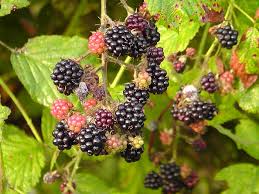Native Vines of BritainVine Muin (Ogham) Grape vine Vitis (Latin)
Bramble Rubus fruticosus (Latin) Traveller’s joy Clematis vitalba ( Latin) The grape vine was a plant revered by the ancient Celts as well as the Romans growing much better in the warmer areas of Europe such as Spain or France than in Britain. The fruit, of course, is known for the making of exquisite wines but also its leaves have many nutritional and medicinal qualities. They can be used as a poultice for wounds and inflammations and eaten raw provide valuable vitamins and minerals as well as being good for calming nerves, skin conditions and a tonic for the blood. The ash of its burned branches provide toothpaste as bracken ash would have done in Britain. Grape vines have been cultivated here to varying degrees of success but I would like to look at native vines that clamber through the trees of a British woodland. Muin is a tree vine, highest of beauty. Highest of beauty, strongest of effort, back of man or ox for they are strongest in regards to effort. Pack of wolves with spears, three Vines. Condition of slaughter. Book of Ballymote 1391 The vines in folklore are said to unite and bring together an accumulation of knowledge linking missing parts and encouraging an unwavering commitment to seek the truth. This search may well be the 'strongest of effort' and the native vine known as bramble certainly grows armed with spears and yet provides such sweet fruit. Bramble seems to be a plant that is cursed and blessed in equal measures. Although weeding it can be a constant back breaking job, a British late summer without the fruit would be tragic. A delicious wine can be made from blackberries which may well lead to a 'condition of slaughter' for alcohol was used to inflame passion and courage on the battle field. Traditionally we are advised not to eat the fruit after Michaelmas day (29th Sept) as the devil spits on them. This is routed in the fact that a flesh fly sucks the juice of the fruit, its saliva turning the fruit mushy and insipid. The Bramble, to which there are over 2000 micro species, is a plant which colonises land easily protecting tree saplings and seeds which will eventually grow through the bramble to create a new woodland habitat; this process can take as little as thirty years and without needing the huge financial input of labour and materials which tree planting requires. In the meantime wildlife is supported by this common species which is home to many invertebrates including the shield bug ( which offers its own life to protect its young) and moth caterpillars. Another native climber is our native clematis which has been given such delightful folk names such as old man’s beard or travellers’ joy. John Gerard (16th century botanist) described it as ‘decking and adorning ways and hedges where people travel.’ Its white or greenish flowers are displayed in the spring followed by distinctive white furry seeds which can be used as tinder. The bark of this plant is also excellent tinder as well as being ideal to make natural rope. The fresh twigs contain sap which can cause irritation and ulcers on the skin. The dried stems have been smoked by young boys giving it the name of ‘boy’s bacci’. If you wish to learn more please subscribe to our free monthly newsletter or join us on a course where we can soak up the beauty of nature and encourage a deeper appreciation.
0 Comments
Leave a Reply. |
Details
Poetry of flowersJoin me to explore the flora of the British Isles on this blog. My intention is to attempt to capture the unique quality and beauty of each species of flower, tree or shrub. For every species featured I will be growing many more wildflowers to celebrate the joy of their existence, their intrinsic conservation value and bewildering array of uses. For nearly 30 years I have noted, studied and explored wildflowers in the field much to the patience of the walker beside me. To share this passion is a heartfelt plea to respect, preserve and care for all British Wildflowers no matter how common they seem. Archives
February 2024
Categories |


 RSS Feed
RSS Feed
